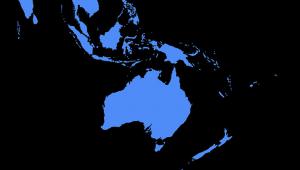In a report published today, the bank said the region’s large economies should be looking to improve tax collection and better manage spending, while their smaller neighbours need to focus on lowering risks to their accounts.
The bank called for such measures in order to build buffers against threats to an otherwise “broadly positive” outlook for the region’s economies over the next three years, including protectionist sentiment, tighter access to finance and rising debt in some economies.
“Sound policies and a gradual pickup in global economic prospects have helped developing East Asia and Pacific sustain growth and reduce poverty,” said Victoria Kwakwa, World Bank vice president for the region.
“For this resilience to be sustained, countries will need to reduce fiscal vulnerabilities while improving the quality of public spending and fostering global and regional integration.”
As an “extremely open” region in terms of its links to the rest of the world, the bank said East Asia and Pacific is “particularly vulnerable” to any slowdown in international trade.
Many fear the presence of US president Donald Trump has raised the likelihood of that eventuality. His arrival in the White House has marked a departure from America’s long-standing advocacy of free trade, to which he has presented a far more hostile approach.
Trump has already withdrawn the country’s involvement in the Trans-Pacific Partnership, a trade deal between a number of nations spanning Asia Pacific and the Americas.
The bank said this could cause Vietnam, and to a lesser extent Malaysia, to miss out on gains from expanded trade and investment.
At the same time, a backlash against globalisation has taken route in a number of other advanced economies too.
While Asia remains bolstered by strong domestic demand, the bank stressed that the uncertainty around the impact of such changes places a premium on China.
It said there is “little rationale” for additional fiscal measures to boost the economy at this time, but efforts to broaden the tax base and improve tax administration could yield “significant gains”.
In China, it called for improved transparency in government and state-owned enterprise finances, as well as stricter budgets for sub-national governments and SOEs.
A wider tax base, especially at the local level, would reduce dependence on revenues from land sales, and improvements to VAT administration would make room to reform labour taxes and business levies, it added.
Meanwhile, there is significant scope to broaden the base for personal income tax and to cut exemptions to general sales tax in Malaysia, and continued rapid growth in the Philippines will “hinge” on how well the government manages large increases in public spending, it said.
The region’s smaller economies need to work on minimising risks to solvency, it continued, including high debts, deficits and spending amid falling revenues in countries like Lao and Mongolia.
“In general, while many countries have announced fiscal consolidation plans, these have been lacking in detail,” the report continued.
Overall, it said measures to boost revenue, including higher tax rates, cuts to generous, untargeted tax exemptions and stronger property and natural resources taxes, combined with less, more efficient, spending were needed.














